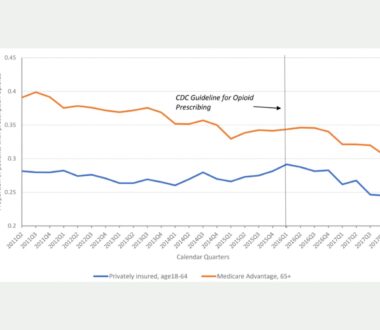
CHERISH Pilot Grantee Highlight Low PrEP Use Among Women
The introduction of pre-exposure prophylaxis (PrEP) for HIV prevention has been paramount to reducing HIV transmission and improving the lives of people living with HIV. However, trends in HIV cases and PrEP uptake suggest unaddressed opportunities to reach women and other communities at risk of contracting HIV. Cis-gender women represent 20% of new HIV cases […]

Announcing the 2025-2026 CHERISH Pilot Grant Recipients
The CHERISH Pilot Grant & Training Core is pleased to support five early-career researchers in their academic journey leading pilot investigations on healthcare utilization, health outcomes, and health-related behaviors related to the care of people who use substances. The funded projects respond to CHERISH’s overall mission and topics of special interest in the call for […]

Catching Up with Pilot Grant Recipients Sierra Castedo de Martell and Bulat Idrisov
In preparation for the 11th cycle of CHERISH pilot grants that is now open, former pilot grant recipients Sierra Castedo de Martell and Bulat Idrisov joined CHERISH Pilot Grant Director Brandon Aden, Senior Research Program Manager Jared Leff, and Communications Manager Bonnie Tse online to meet prospective applicants. Attendees raised questions about eligibility, the pilot […]

Racial and Ethnic Disparities Along the Hepatitis C Care Cascade Among Priority Populations
Over the last two decades, injection opioid use has increased among reproductive-aged women, with resultant increases in mother-to-child hepatitis C virus (HCV) transmissions in the U.S. Direct-acting antiviral (DAA) treatment is highly effective at reducing and eliminating the risk of HCV transmissions. Yet, studies show lower odds of receiving DAA treatment for women compared to […]

Announcing the 10th Pilot Grant Cohort Advancing the Treatment of Substance Use Disorders, HCV, and HIV
CHERISH is excited to welcome a new pilot grant cohort for the 10th year. Spearheaded by CHERISH Pilot Grant Program Director Brandon Aden, the program is designed to help researchers gain familiarity with health economic evaluations, apply related methodologies to their pilot research, and build out the next stage of their careers. This year, CHERISH […]

CHERISH Welcomes Pilot Grant Recipients to Advance the Treatment of Substance Use Disorders, HCV, and HIV
Meet the ninth cohort of early-career investigators from the states of California, Texas, and Washington. CHERISH awarded each investigator up to $20,000 for a pilot study that focuses on conducting health economics research in substance use, hepatitis C virus (HCV), and HIV. This year, CHERISH also encouraged applicants to integrate drug overdose prevention, the syndemics […]

Catching Up with Pilot Grant Recipient: Rachel Epstein
Rachel Epstein is a clinician-scientist with demonstrated experience in analyzing large datasets to inform hepatitis C (HCV), HIV, and substance use disorder interventions. A CHERISH pilot grantee in 2019, she worked closely with her co-investigators Benjamin Linas, CHERISH Population Data and Modeling Core director, and Shashi Kapadia, a CHERISH Research Affiliate and an infectious diseases physician at Weill […]

Five Researchers Receive CHERISH Pilot Awards to Advance the Treatment of Substance Use Disorders, HCV, and HIV
The Center for Health Economics of Treatment Interventions for Substance Use Disorder, HCV, and HIV (CHERISH) is proud to recognize five early-stage researchers who will receive up to $20,000 in pilot grant funding between 2022 and 2023. Through the CHERISH pilot grant, researchers can investigate innovative methodologies or applications, collect preliminary data to inform external […]

Catching Up with Pilot Grant Recipients Ali Jalali, Austin Kilaru, and Hao Zhang
Every spring, the Center for Health Economics of Treatment Interventions for Substance Use Disorder, HCV, and HIV (CHERISH) awards competitive pilot grants to investigators interested in developing health economic research in our areas of interest, with a focus on junior investigators and trainees. Funded by the National Institute on Drug Abuse, CHERISH pilot grants provide these investigators […]

The Impact of Recreational Cannabis Laws and Cannabis Use Disorder Among Pregnant Patients
To date, the American College of Obstetricians and Gynecologists advises pregnant patients not to use cannabis because of the increased risks of health complications to the pregnant individual and the newborn. However, as states expand access to recreational or medical cannabis, there is growing evidence of increased cannabis use and positive perceptions of cannabis among pregnant patients. […]

Pilot Grant Recipients Receive Funding to Examine Health Disparities Related to the Treatment of Substance Use Disorders, HCV, and HIV
Shoshana Aronowitz, PhD, MSHP, FNP-BC Follow Shoshana Aronowitz, PhD, MSHP, FNP-BC, on Twitter @shoshiaronowitz. Shoshana Aronowitz is a family nurse practitioner, community-engaged health services researcher, and assistant professor in the Department of Family and Community Health at the University of Pennsylvania School of Nursing. Her research examines innovative delivery models to promote equitable access to substance […]

Prescription Opioids Dispensed to Patients with Cancer with Bone Metastasis: 2011-2017
In the past decade, opioid prescribing in the United States has steadily decreased as federal and state officials implemented strict regulations on prescription opioids to address the opioid crisis. The downward trend sparked concerns of undertreating chronic pain and prompted the Centers for Disease Control and Prevention (CDC) to formally clarify that the 2016 CDC […]
Engage with CHERISH
Submit a Consultation Request or Contact Us to learn more about how CHERISH can support your research or policy goals.